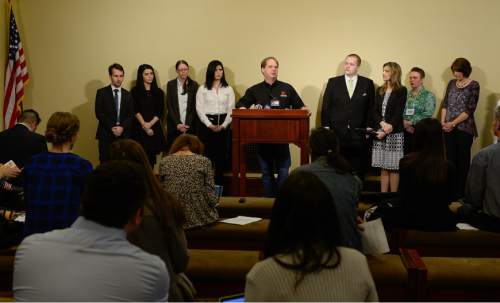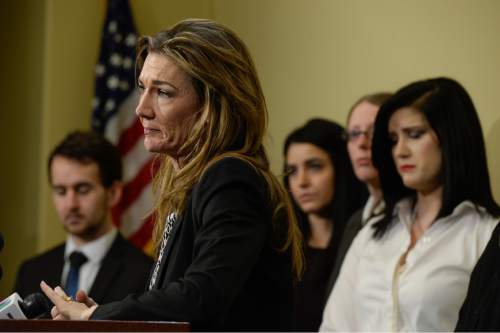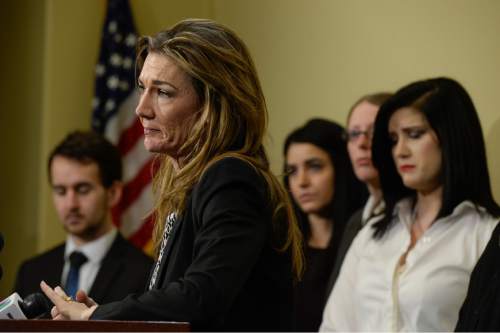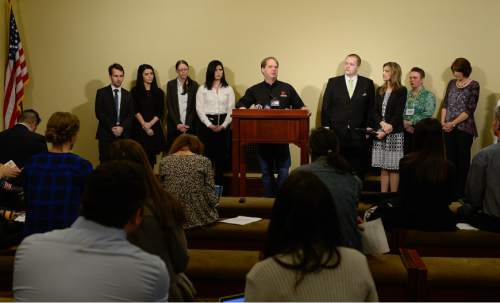This is an archived article that was published on sltrib.com in 2016, and information in the article may be outdated. It is provided only for personal research purposes and may not be reprinted.
Conceding that the Utah Legislature is unlikely to pass a bill legalizing medical marijuana, Utah patients who have been using the plant along with backers of legal cannabis — including several wealthy and well-connected Utah businessmen — plan to launch a ballot initiative that would let voters decide whether to make Utah the 24th state to legalize the drug for medical purposes.
Medical-marijuana proponents had been advocating for Sen. Mark Madsen's SB73, which would allow "whole-plant" access, meaning the use of products that contain THC, for patients with a series of conditions. But that bill faced an uncertain future even before The Church of Jesus Christ of Latter-day Saints, Utah's predominant faith, issued two statements in a week opposing the measure.
Now Madsen's bill appears almost certain to fail in the House, assuming it can get through the Senate later this week, and its backers are turning to an initiative as their only remaining option.
"We believed in the system. We fought legislatively to have our voices heard, and we can't wait for the Legislature to become comfortable with my medication, with [multiple sclerosis] patients' medication, with cancer patients' medication," said Christine Stenquist, president and co-founder of TRUCE. "If the Legislature won't listen, we will take it to the people."
The challenge of getting the measure on the ballot this year will be severe and the time frame short for supporters.
They have until April 15 to file their initiative, get a legal and fiscal review on the measure, hold a series of seven town hall meetings around the state, all before they can begin gathering the 101,744 signatures — 10 percent of the voters in 26 of the 29 Senate districts — needed to put the initiative on November's ballot.
But David Kirkham, owner of Kirkham Motorsports and a co-founder of Utah's tea party movement, said supporters have lined up financial commitments from several wealthy and prominent Utahns, including Overstock.com CEO Patrick Byrne, XMission founder Pete Ashdown and tech millionaire and philanthropist Bruce Bastian.
They also have backing from political consultant Peter Valcarce; California-based tech investor Scott Banister, who backed legalization efforts in Colorado; and have hired Sierra Pacific Strategies, a consulting firm that has successfully passed 13 ballot initiatives across the country.
"Do we expect sick people to do this, or are we going to help them?" Kirkham said. "I mean, God forbid we're in their place."
Since 1960, 20 initiatives and referendums have made it to the ballot, six of which were approved. The most recent was the 2007 referendum repealing Utah's school-vouchers law.
Madsen's measure is expected to come up for a vote this week, along with a competing bill, SB89, sponsored by Sen. Evan Vickers, R-Cedar City, and Rep. Brad Daw, R-Orem.
The Vickers bill, which the LDS Church has not objected to, does not allow marijuana extracts that contain THC — the psychoactive chemical in marijuana — includes fewer ailments, and does not protect parents who use the medications for them or their children.
Stenquist said the Vickers bill "truly does nothing for us patients," adding that she anticipates filing the initiative with the lieutenant governor's office by week's end.
Enedina Stanger, who suffers from a rare disease that attacks her joints, allowing her limbs to dislocate and causing intense pain, said she was sad the Legislature appears unlikely to pass the Madsen bill, because it protects parents like her from losing custody of their children if they use medical marijuana.
Stanger was arrested in October for using medical marijuana for her condition. She has since uprooted her family and moved to Colorado, where she can use the drug legally.
"At the same time, it's just a little battle and it's a big, big war we're fighting, and it's a lot of people and a lot of re-education and rethinking," she said. "So if this is the step we have to take as patients and if this initiative is going to help us, then that's what we're looking for."
Dallas Sainsbury, who suffers from Crohn's disease and has used medical marijuana to supplant the opioid medications she had been prescribed, said that, for some patients, legalizing medical marijuana is an urgent issue and it is disappointing the Legislature appears unlikely to act.
"There are a lot of people who don't have time to wait for stuff like this to happen," she said. "There are some people who want this to pass that won't be here by November [for the ballot initiative], so I wish that we had better odds at this point for it to pass [the Legislature]."
Getting the signatures for the ballot can be done, she said, but it makes people wait longer than if the Legislature acted.
Twitter: @RobertGehrke









